Eating oatmeal every day is a popular choice for many people looking to improve their health. Oatmeal is a nutritious whole grain that is high in fiber, protein, and various vitamins and minerals. It is also a great source of antioxidants and can help lower cholesterol levels.

Introducing Sugar Defender, an advanced blend of 24 proven ingredients that support healthy glucose levels and natural weight loss.
Some of the benefits of eating oatmeal every day include improved digestion, increased energy levels, and better heart health. The fiber in oatmeal helps to keep the digestive system running smoothly, while the complex carbohydrates provide sustained energy throughout the day. Additionally, the beta-glucan in oatmeal has been shown to lower LDL cholesterol levels, which can reduce the risk of heart disease.
However, it’s important to note that eating too much oatmeal can have negative effects on the body as well. Consuming excessive amounts of oatmeal can lead to digestive issues, such as bloating and gas. It can also cause a spike in blood sugar levels, which can be harmful for people with diabetes or other blood sugar-related conditions. Overall, incorporating oatmeal into a balanced diet can have many health benefits, but it’s important to consume it in moderation.
Nutritional Profile of Oatmeal
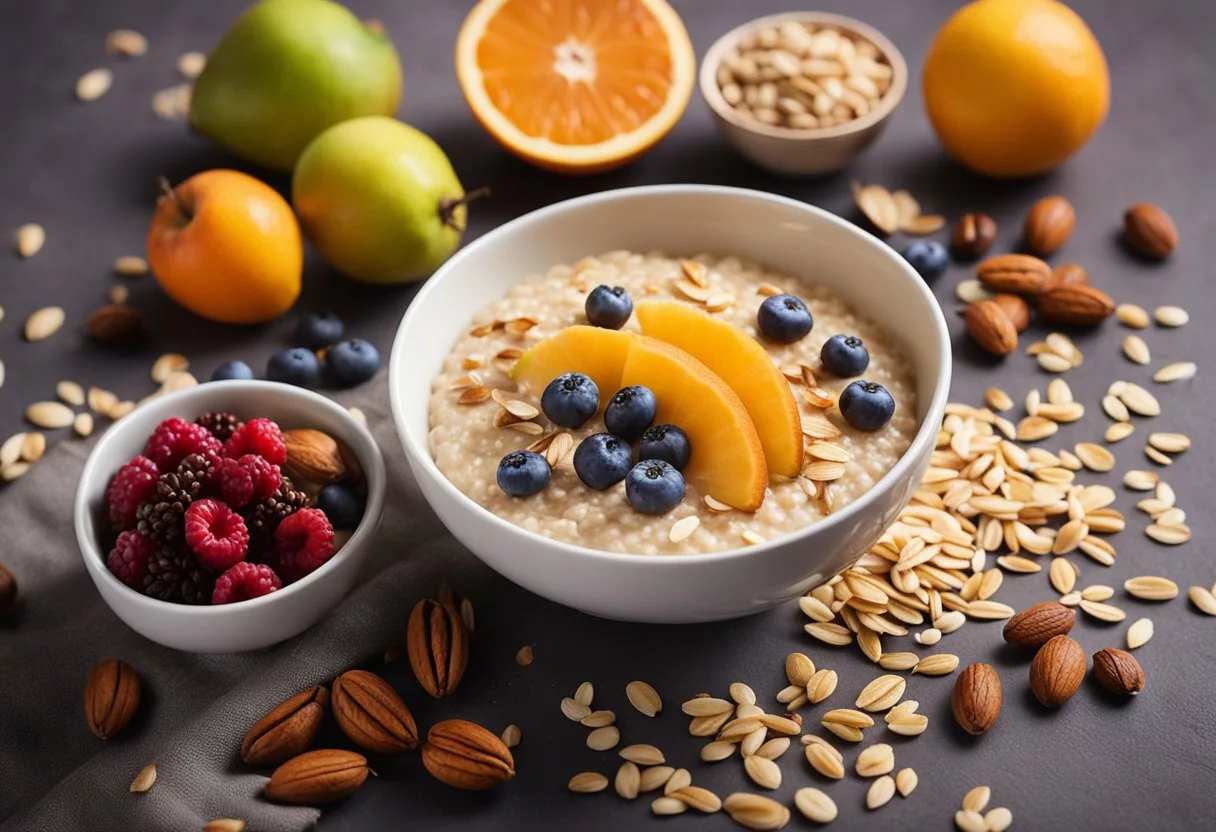
Oatmeal is a nutritious breakfast option that provides several essential vitamins and minerals. It is a good source of dietary fiber, protein, and carbohydrates, making it a filling and satisfying meal to start the day.
Vitamins and Minerals Content
Oatmeal is rich in various vitamins and minerals, including iron, magnesium, and zinc. One cup of cooked oatmeal contains about 2 milligrams of iron, which is about 11% of the recommended daily intake for men and 5% for women. Oatmeal also contains 57 milligrams of magnesium, which is about 14% of the recommended daily intake for men and 18% for women. Additionally, one cup of oatmeal provides 2 milligrams of zinc, which is about 18% of the recommended daily intake for men and 13% for women.
High Fiber and Beta-Glucan
Oatmeal is an excellent source of dietary fiber, which is essential for maintaining good digestive health. One cup of cooked oatmeal contains about 4 grams of fiber, which is about 16% of the recommended daily intake for men and 22% for women. Oatmeal is also rich in beta-glucan, a type of soluble fiber that has been shown to have cholesterol-lowering effects. According to a 2021 review published in Foods, oat beta-glucan has positive effects on hyperglycemia, lowering blood lipid levels, and reducing weight.
Carbohydrates and Protein Balance
Oatmeal is a good source of carbohydrates, providing about 27 grams per cup of cooked oatmeal. It also contains a balance of protein, with one cup of cooked oatmeal containing about 6 grams of protein. The carbohydrate and protein balance in oatmeal makes it a good breakfast option for people looking to manage their weight or blood sugar levels.
Overall, oatmeal is a nutritious breakfast option that provides several essential vitamins and minerals, high fiber, and beta-glucan. It is a filling and satisfying meal that can help people manage their weight and blood sugar levels.
Health Benefits
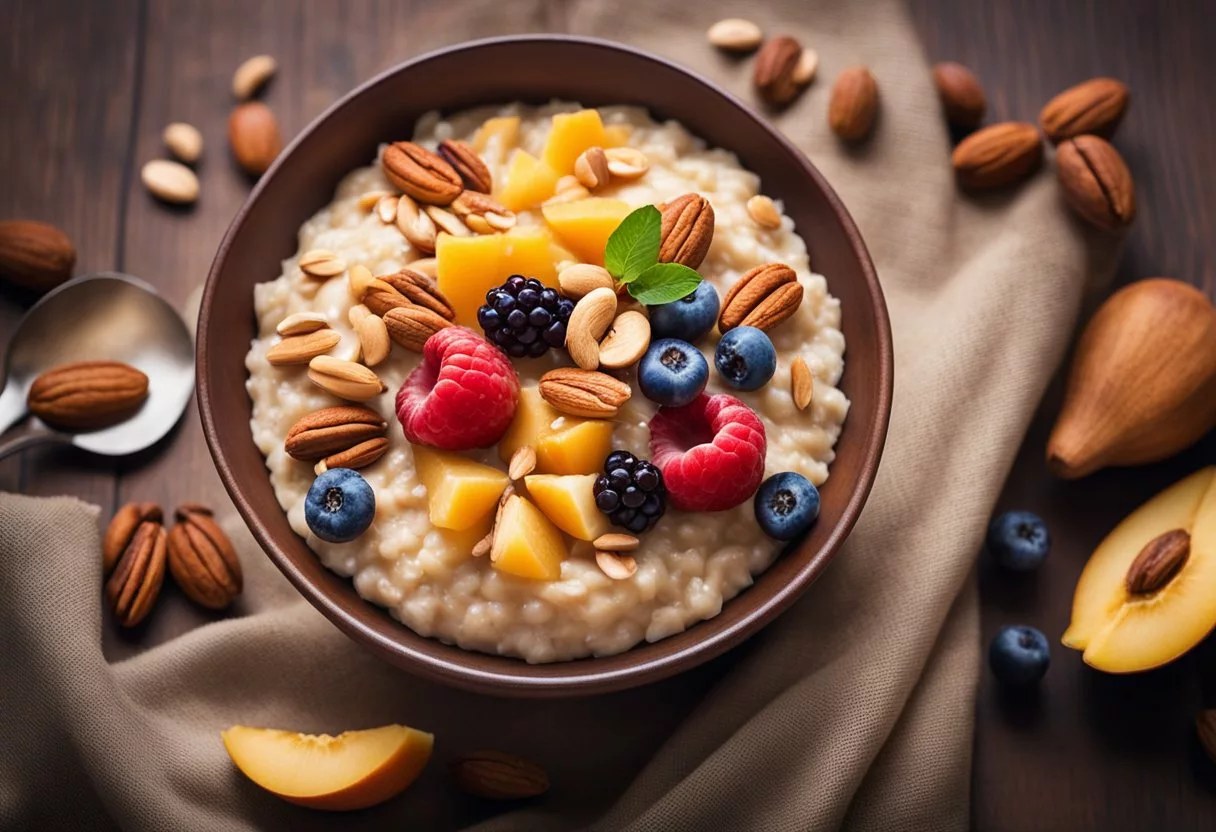
Eating oatmeal every day has numerous health benefits that can help improve overall well-being. Some of the most notable health benefits of eating oatmeal include heart health, blood sugar regulation, digestive and gut health, weight management, and immune system support.
Heart Health and Cholesterol Control
Oatmeal is rich in soluble fiber, which has been shown to help lower cholesterol levels and reduce the risk of heart disease. According to a 2021 review published in Foods, oat beta-glucan has positive effects on hyperglycemia, lowering blood lipid levels, and reducing weight. The fiber content of oatmeal is filling and satiating, which in turn can help with eating fewer calories throughout the day and managing weight.
Blood Sugar Regulation
Eating oatmeal every day can help regulate blood sugar levels, which is especially important for people with diabetes or those at risk of developing the disease. The soluble fiber in oatmeal slows down the absorption of sugar into the bloodstream, preventing spikes in blood sugar levels. In addition, oatmeal contains magnesium, which is essential for insulin secretion and glucose control.
Digestive and Gut Health
Oatmeal is a prebiotic food that helps feed the beneficial bacteria in the gut, promoting a healthy gut microbiome. The fiber in oatmeal also helps regulate bowel movements and prevents constipation. Furthermore, oatmeal contains antioxidants that can help reduce inflammation in the gut and improve overall digestive health.
Weight Management and Satiety
Eating oatmeal every day can help with weight management and satiety. The fiber in oatmeal helps keep you feeling full and satisfied, which can prevent overeating and snacking between meals. In addition, oatmeal is a low-calorie food that can help with weight loss when consumed as part of a healthy diet and lifestyle.
Immune System Support
Oatmeal contains beta-glucans, which are complex sugars that have been shown to have immune-boosting properties. According to a source, beta-glucans stimulate the immune system and help the body fight off infections and diseases. In addition, oatmeal contains vitamins and minerals that are essential for immune system function, including zinc and vitamin E.
Overall, eating oatmeal every day can have numerous health benefits that can help improve overall well-being. From heart health and cholesterol control to blood sugar regulation and immune system support, oatmeal is a nutritious food that should be included as part of a healthy diet and lifestyle.
Types of Oatmeal
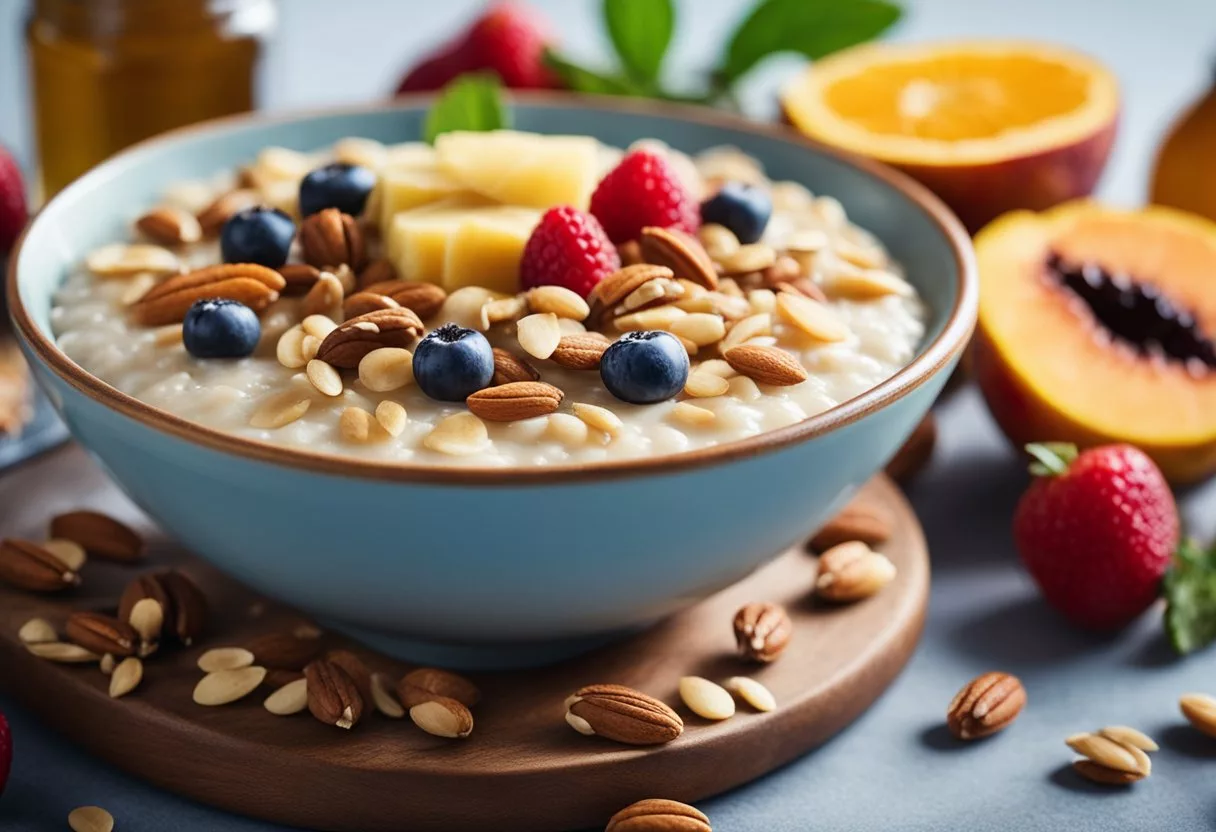
Steel-Cut Oats vs Rolled Oats vs Instant Oatmeal
Oatmeal is a popular breakfast food that comes in different types. The three most common types of oatmeal are steel-cut oats, rolled oats, and instant oatmeal. Steel-cut oats are the least processed and take the longest to cook, while instant oatmeal is the most processed and cooks the fastest. Rolled oats are somewhere in between.
Steel-cut oats are made by cutting the whole oat groat into pieces with a steel blade. They have a chewy texture and nutty flavor. Rolled oats are made by steaming the oat groat, then rolling it into flakes. They have a softer texture and milder flavor than steel-cut oats. Instant oatmeal is made by pre-cooking the oatmeal and then dehydrating it. It is the most processed type of oatmeal and often contains added sugar and flavorings.
Whole Grain Benefits
All types of oatmeal are made from whole grains, which are an important part of a healthy diet. Whole grains are a good source of fiber, vitamins, and minerals. They can help lower the risk of heart disease, stroke, and type 2 diabetes. Eating whole grains may also help with weight management and digestive health.
Steel-cut oats are the least processed and have the highest fiber content of the three types of oatmeal. Rolled oats have a slightly lower fiber content, but are still a good source of fiber. Instant oatmeal often contains added sugar and flavorings, which can make it less healthy than the other types of oatmeal.
In summary, all types of oatmeal are a good source of whole grains and can be part of a healthy diet. Steel-cut oats and rolled oats are less processed and generally healthier than instant oatmeal.
Incorporating Oatmeal in Your Diet
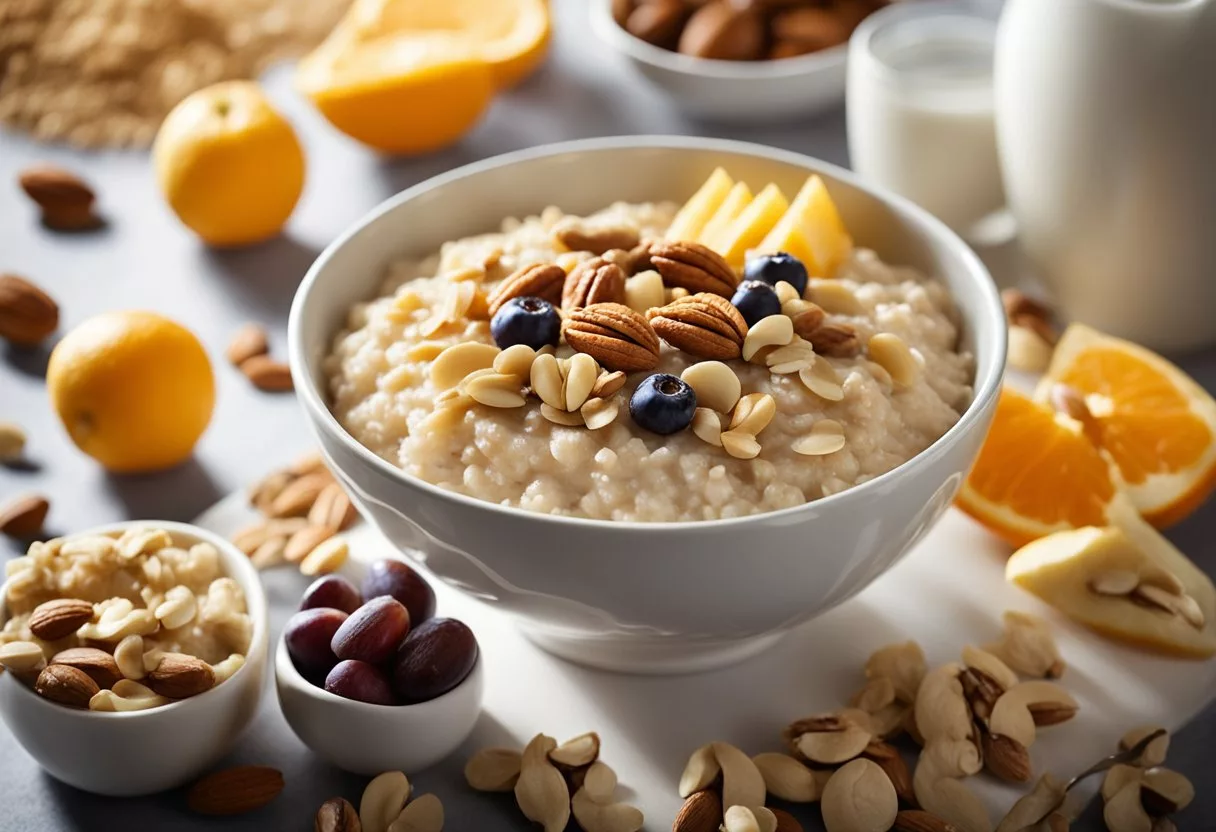
If you’re looking to incorporate oatmeal into your diet, there are a variety of ways to do so. Here are a few ideas to get you started:
Healthy Breakfast Ideas
Oatmeal is a great option for a healthy breakfast. You can prepare it as a warm porridge, overnight oats, or baked oatmeal. To make a nutritious bowl of oatmeal, cook 1/2 cup of old-fashioned oats with 1 cup of water or milk. Then, add your favorite toppings such as fresh fruit, nuts, or seeds. For extra sweetness, you can add a drizzle of honey or maple syrup.
Oatmeal-Based Recipes
Oatmeal can also be used in a variety of recipes, from muffins to cookies to savory oats. For a healthy snack, try making oatmeal muffins with mashed bananas and chopped nuts. For a hearty lunch, try savory oats with roasted vegetables and a fried egg on top. Oatmeal cookies can also be a healthier alternative to traditional cookies, as they are lower in sugar and higher in fiber.
Gluten-Free Options
If you are gluten-free, make sure to choose certified gluten-free oats. Oats themselves do not contain gluten, but they may be processed in facilities that also process wheat, barley, or rye. To avoid cross-contamination, look for oats that are certified gluten-free. You can use these oats in any of the recipes mentioned above.
Overall, oatmeal is a versatile and nutritious food that can be incorporated into a variety of meals and snacks. Whether you prefer sweet or savory, hot or cold, there is an oatmeal recipe out there for you. So go ahead and give it a try!
Considerations and Variations
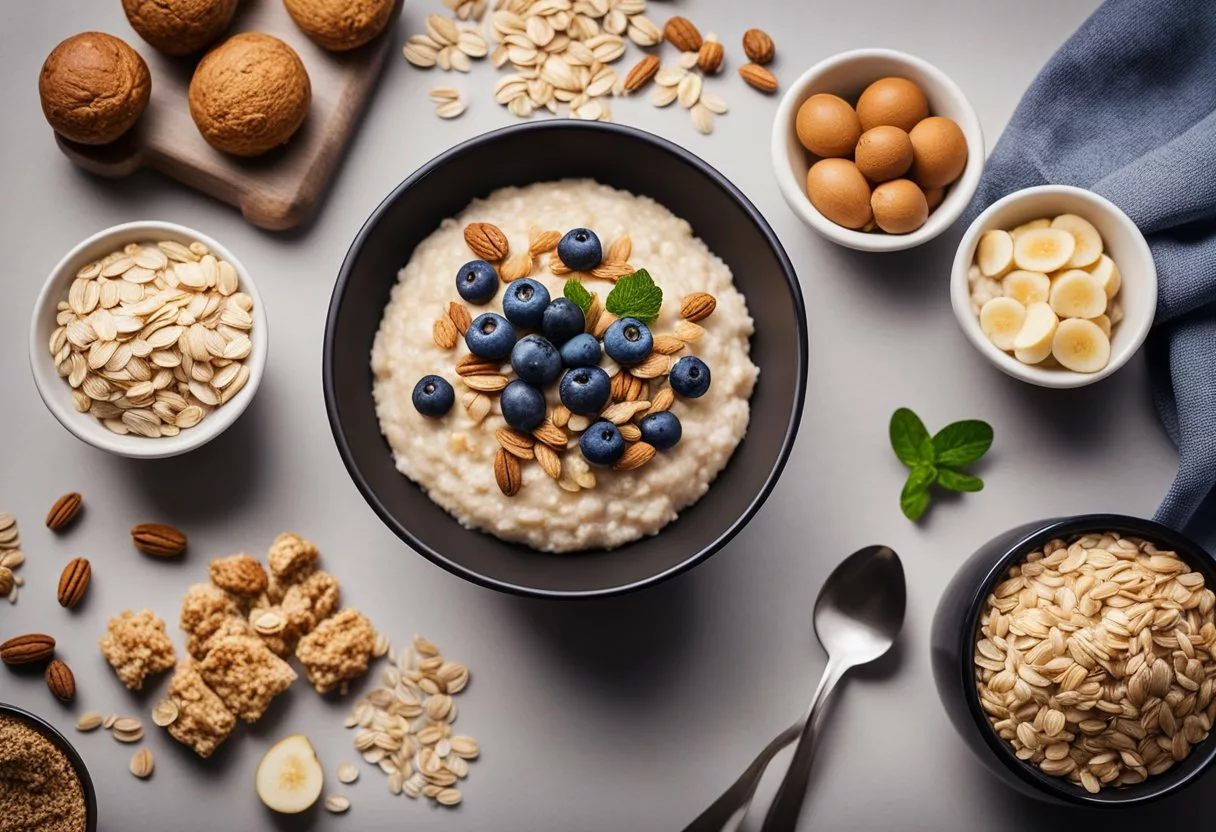
Adding Nuts, Fruits, and Seeds
Adding nuts, seeds, and fruits to oatmeal can provide additional nutritional benefits. Nuts and seeds are a good source of healthy fats, protein, and fiber. They can also add a crunchy texture and nutty flavor to oatmeal. Some good options include almonds, walnuts, chia seeds, and flaxseeds. Fruits, such as blueberries, raisins, and apples, can add natural sweetness and provide additional vitamins and minerals.
Sugar and Fat Content
While oatmeal is a healthy breakfast option, it is important to be mindful of added sugars and fats. Some flavored oatmeal packets can contain high amounts of added sugars, which can lead to spikes in blood sugar levels. It is recommended to choose plain oatmeal and add natural sweeteners, such as honey or maple syrup, if desired. Adding butter or nut butter can also increase the fat content of oatmeal. It is recommended to use these in moderation.
Understanding Food Labels
Reading food labels can help individuals make informed choices about the oatmeal they consume. When looking at the label, check the serving size, total calories, and the amounts of sugar, fat, and fiber. Look for oatmeal that is high in fiber and low in added sugars. It is also recommended to choose oatmeal that is minimally processed and does not contain artificial ingredients.
In summary, adding nuts, fruits, and seeds can provide additional nutritional benefits to oatmeal. It is important to be mindful of added sugars and fats, and to read food labels to make informed choices. By making these considerations and variations, individuals can enjoy the health benefits of oatmeal as part of a balanced diet.
Potential Health Concerns

Managing Caloric Intake
While oatmeal can be a nutritious addition to one’s diet, it is important to be mindful of portion sizes and added ingredients, as they can significantly impact caloric intake. For example, adding sugar, honey, or other sweeteners can increase the calorie count of a serving of oatmeal. Additionally, adding high-calorie toppings like nuts or dried fruit can also contribute to a higher caloric intake.
Food Allergies and Sensitivities
Individuals with celiac disease or gluten sensitivity should be cautious when consuming oatmeal, as it may contain gluten. However, pure oats are naturally gluten-free and can be safely consumed by those with gluten sensitivities. It is important to read labels carefully and choose certified gluten-free oatmeal to avoid cross-contamination.
Effects on Bowel Health
Oatmeal is high in fiber, which can promote regular bowel movements and prevent constipation. However, consuming too much fiber can have the opposite effect and lead to diarrhea or other digestive issues. It is important to gradually increase fiber intake and drink plenty of water to avoid any adverse effects on bowel health.
Overall, oatmeal can be a healthy and nutritious addition to one’s diet. However, it is important to be mindful of portion sizes, added ingredients, and any food allergies or sensitivities. By incorporating oatmeal into a balanced diet, individuals can reap the potential health benefits while minimizing any potential health concerns.
Scientific Insights
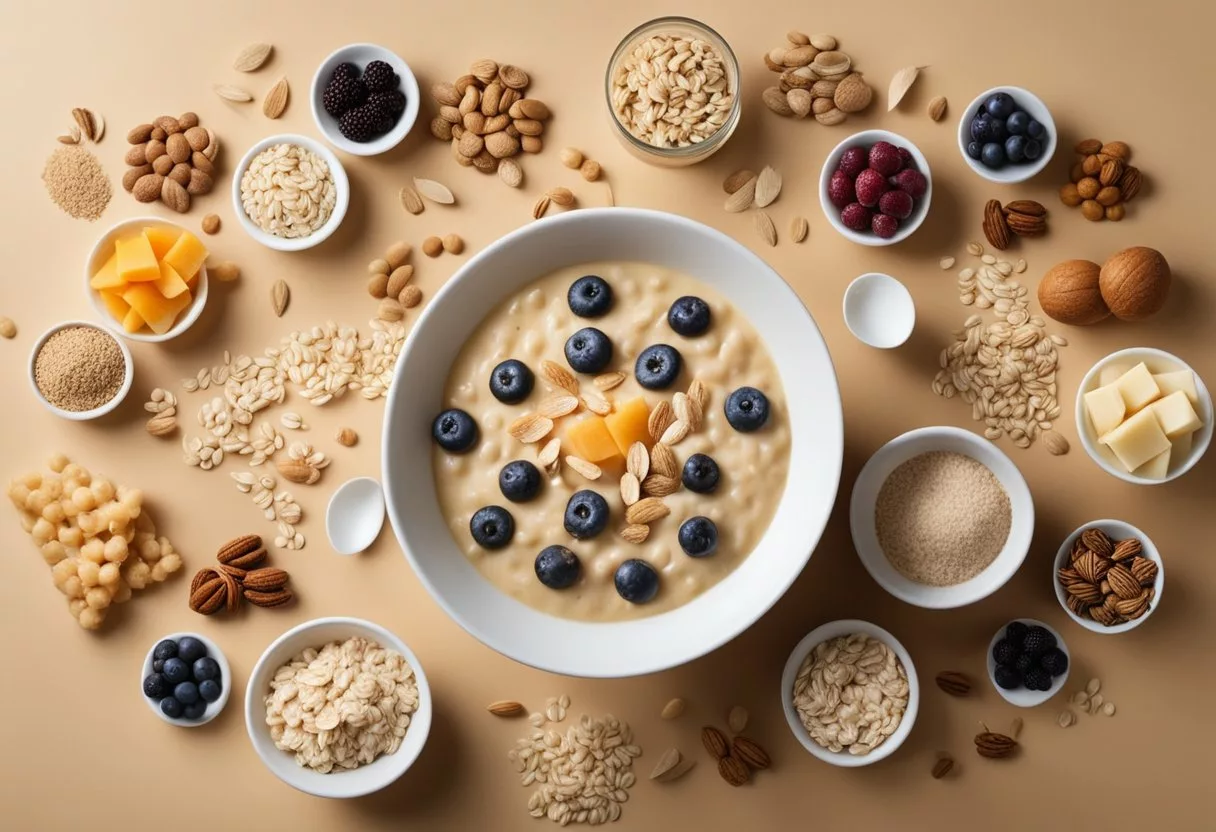
Oatmeal and Chronic Disease Prevention
Oatmeal is a nutritious food that has been linked to several health benefits. According to a review published in Foods, oat beta-glucan has positive effects on hyperglycemia, lowering blood lipid levels, and reducing weight. Oatmeal is also a good source of fiber, which can help improve digestion and reduce the risk of chronic diseases such as heart disease, stroke, and cancer.
Studies have shown that consuming oatmeal regularly can help lower blood pressure and reduce the risk of developing type 2 diabetes. The fiber in oatmeal can also help regulate blood sugar levels and improve insulin sensitivity.
Inflammation and Antioxidants
Inflammation is a natural response to injury or infection, but chronic inflammation can lead to several chronic diseases. Oatmeal contains antioxidants that can help reduce inflammation in the body. Antioxidants are compounds that protect cells from damage caused by free radicals, which are unstable molecules that can cause cellular damage.
Oatmeal is a good source of antioxidants such as avenanthramides, which have been shown to have anti-inflammatory effects. These compounds can help reduce inflammation in the body and may help prevent chronic diseases such as heart disease, cancer, and asthma.
Overall, consuming oatmeal regularly can provide several health benefits. It is a nutritious food that can help improve digestion, reduce inflammation, and lower the risk of chronic diseases.